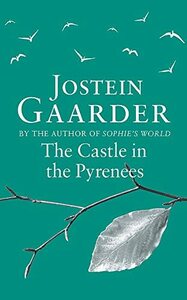Take a photo of a barcode or cover
Mysterious, interesting, thought-provoking, slightly creepy book, with the philosophical themes you find in the other books by Gaarder.
The story is an email correspondence between two old friends/lovers but perhaps because it is a translated text it doesn't flow as well as it could. There are plenty of location references which mean nothing if you're not acquainted to Norway and which originate too many halts in the reading process.
Towards the end, I could guess where it was going and I feared it was going to be even creepier than it was. Fortunately it wasn't, but it was nevertheless a sad ending...or perhaps it was a happy ending. I guess it depends on which side of the discussion you stood on: whether you went for the more scientific, seeing-is-believing attitude, or the spiritual, meaning-seeking perspective over life. It is very much open to all interpretations and it leaves you with a few conclusions to draw for yourself, and that's what makes a good philosophical book.
The story is an email correspondence between two old friends/lovers but perhaps because it is a translated text it doesn't flow as well as it could. There are plenty of location references which mean nothing if you're not acquainted to Norway and which originate too many halts in the reading process.
Towards the end, I could guess where it was going and I feared it was going to be even creepier than it was. Fortunately it wasn't, but it was nevertheless a sad ending...or perhaps it was a happy ending. I guess it depends on which side of the discussion you stood on: whether you went for the more scientific, seeing-is-believing attitude, or the spiritual, meaning-seeking perspective over life. It is very much open to all interpretations and it leaves you with a few conclusions to draw for yourself, and that's what makes a good philosophical book.
Usually email correspondence novels can be a bit.. childlike and awkward, but this novel does it very well. Interesting story with a twist and lots of philosophical life-pondering, which I like very much. However, the ending disappointed me in a way, it felt a bit rushed. Expected a bit more closure.
Zpočátku se tato kniha jevila velmi zajímavě. Střet spiritualistického a racionálního vidění světa, no paráda. Jenže postupně jsem začala zjišťovat, že to je jen prázdná skořápka, která se snaží tvářit hrozně chytře a intelektuálně. Ale není. Je falešná a nezáživná. Není divu, že jsem ji s velkými přestávkami četla téměř čtyři měsíce. Bohužel je zkrátka plytká, nudná a nic ve vás nezanechá. Od autora mistrovského Sofiina světa je to dost velké zklamání.
This book is more interesting than beautiful. I've always said that throughout reading it and I keep saying it now. Josten Gaarder's style didn't impress me in Sophie's World, and it didn't impress me now. But his story - oh well. The whole book is made of an exchange of emails between two lovers who have found themselves again 30 years after a mysterious event had made them break up. It's mostly a contradictory discussion on two views: one, religious, in life after death, and the other, realistic and scientific. It's quite smart and the ending is good.
Milý Josteine Gaardere,
tohle byl prostě přešlap, přiznej si to. Milostný a mystický příběh Solrun a Steinna jsi utopil v dogmatických nábožensko-ekologických žvástech vytvarovaných do podoby e-mailů, které by si ale zdraví lidé sotva napsali. A tím rádoby epickým vyvrcholením jsi to taky nevytáhl.
Buď od té lásky a vrať se ke své etice Sofiina světa a k Principálově dceři, Tajemství karet a Dívce s pomeranči.
Toť vše, Bětka
tohle byl prostě přešlap, přiznej si to. Milostný a mystický příběh Solrun a Steinna jsi utopil v dogmatických nábožensko-ekologických žvástech vytvarovaných do podoby e-mailů, které by si ale zdraví lidé sotva napsali. A tím rádoby epickým vyvrcholením jsi to taky nevytáhl.
Buď od té lásky a vrať se ke své etice Sofiina světa a k Principálově dceři, Tajemství karet a Dívce s pomeranči.
Toť vše, Bětka
للأسف مملة, كبركة ماء هادئة ليست بها اى حركة
أقل طبعا من عالم صوفي
أقل طبعا من عالم صوفي
This book isn't so much a story, so much as a philosophical exploration of the belief of two ex-lovers, one who believes strongly in spirituality, consciousness and the afterlife and the other an atheist who strictly believes in science. Definitely not what I was expecting, I was expecting a mystery story about what had happened to the two characters that was so drastic is caused them to separate thirty years previous. The book is written as email correspondences, and once you get based the first 150 pages, you finally do get a detailed account of what happened that day. It's not a bad book, it just wasn't what I was expecting. On that note, the last ten pages definitely left an impact on the reader.
The whole book is an email chain of philosophical discussion about the world and universe, life and death, belief and rational thought, and what happened thirty years ago to the two then-lovers. I felt that the story never quite lifted up beyond the philosophy, and while the philosophy was interesting, it wasn't enough. The landscape was very much a part of this story and I did find that fascinating.
Zpočátku se tato kniha jevila velmi zajímavě. Střet spiritualistického a racionálního vidění světa, no paráda. Jenže postupně jsem začala zjišťovat, že to je jen prázdná skořápka, která se snaží tvářit hrozně chytře a intelektuálně. Ale není. Je falešná a nezáživná. Není divu, že jsem ji s velkými přestávkami četla téměř čtyři měsíce. Bohužel je zkrátka plytká, nudná a nic ve vás nezanechá. Od autora mistrovského Sofiina světa je to dost velké zklamání.
At times a confusing book, part philosophical treatise, part ghost story and partly a tale of lost love. Told in email style for much of the book. Overall an enjoyable read



